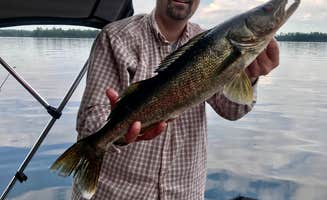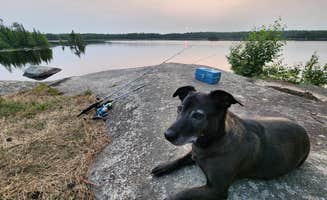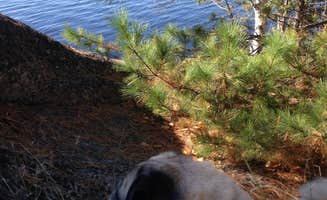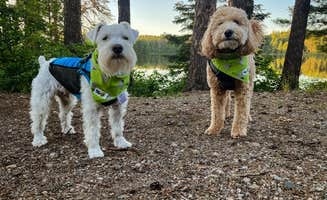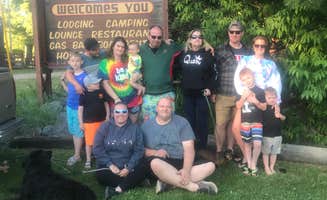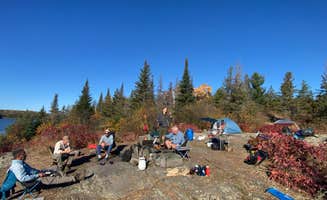Crane Lake camping areas occupy remote northeastern Minnesota terrain at approximately 1,142 feet elevation, near the Canadian border and Voyageurs National Park. The region features boreal forest ecosystems with tamarack, spruce, and pine trees surrounding interconnected waterways. Winter temperatures often drop below -30°F while summer camping season runs May through September with daytime temperatures typically between 65-80°F.
What to do
Hiking trails nearby: Several campgrounds near Crane Lake connect to hiking paths with varying difficulty levels. The Vermilion Gorge Trail features "sheer granite cliffs and waterfalls" and requires caution with small children, according to reviews at Crane Lake Primitive Campgrounds. At Lake Jeanette Campground, trails wind through former CCC camp areas with "little bits of evidence around if you look for them."
Fishing opportunities: The lakes surrounding Crane Lake contain diverse fish populations. Mukooda Lake hosts "a unique subspecies of lake trout found nowhere else in the world" due to its "unique substrate and hydrology." Reviewers note consistent catches across the region, with one camper reporting "my hubby caught a bunch of fish" during their stay at Woodenfrog Campground.
Wildlife viewing: The Crane Lake area hosts abundant wildlife viewing opportunities. One camper at Lake Jeanette Campground reported "lots of deer walking right thru our site," while others spotted "bald eagles fly by every afternoon" from The Pines of Kabetogama Resort. For bird enthusiasts, "loons and ducks at dusk and dawn" create memorable soundscapes across the lakes.
What campers like
Easy boat access: Most campsites near Crane Lake provide water access options. At Indian Island Canoe Campsite, "fairly easy access to grab drinking water for filtering" combines with "great sunset" views facing west. Woodenfrog Campground offers "beach and dock access and the lake itself is beautiful" with "overnight parking for boaters."
Private, spacious sites: Campers consistently praise the privacy between sites. At Echo Lake Campground, "the campsites are large and spaced out well" creating a "peaceful, beautiful campground." Headquarters RV Park provides "a lot of privacy with the trees surrounding the site" where "the easements were freshly mowed."
Night skies: The remote location offers exceptional stargazing. The Pines of Kabetogama Resort sits within a Dark Sky Certified area where "they ask you to turn off your outside lights after quiet hours" and "everyone we camped by did this." Lake Jeanette campers report the stars are "incredibly bright at night" with "no people or towns to make noise or light."
What you should know
Reservation requirements: Most campgrounds operate on different reservation systems. Headquarters RV Park requires advance reservations while Indian Island sites remain "free sites" available "first-come, first-served." Mukooda Lake charges "$20.00 per night, and there is also a $10.0 fee for reserving online, which you have to do before arriving."
Water access logistics: Many campsites require boat transportation. Mukooda Lake involves "a bit of an expedition" where you "need to use a small motorboat or paddle a canoe or kayak from Crane Lake to SandPoint Lake, then turn west into a small bay and dock at the Mukooda Access." Some campers hire water taxis from Crane Lake outfitters.
Seasonal considerations: The camping season runs limited months. Most campgrounds open "May 7 to October 15" with some like Headquarters RV Park running "May 1st-October 31." Summer brings insects, with one camper noting "Flies and Mosquitoes were bad but eventually left us alone" while another reported "Neither Mosquitoes nor Gnats nor Noseeums kept us away."
Tips for camping with families
Campsite selection: Choose sites based on water proximity and accessibility. At Mukooda Lake Campground, each campsite includes "a fire pit with grate, picnic table, and bear box" making it "unexpectedly quite friendly to someone new to canoe camping." Sites with direct water access work best for families with children who enjoy swimming.
Beach options: Several campgrounds offer dedicated swimming areas. Woodenfrog Campground provides "a nice day use area with beach and picnic" facilities ideal for families with children. Echo Lake features "a very nice beach" according to reviewers, though some note limited exploration options when using as "just a stopping point."
Food storage: Wildlife precautions remain essential even in developed areas. Even on islands, "it's advisable to hang a bear bag" which "also helps with other critters like squirrels and mice." Mukooda Lake provides bear boxes at each site for "secure food storage away from wildlife and curious pets."
Tips from RVers
Site selection: RV campers should research site specifications before arrival. At Woodenfrog Campground, "some sites are not very level and some are TINY so choose carefully" making site research critical. The campground works well for "tents & small RVs/truck campers" but larger rigs may find access difficult.
Hookup availability: Full-service options remain limited in the region. The Pines of Kabetogama Resort offers "full hookup sites with a spacious, level gravel pad" while Headquarters RV Park provides "20, 30, and 50 amp service" along with "a potable water station." At Ash River Campground, one reviewer noted "Full hookups, good spacing, clean bathrooms and showers."
Connectivity: Cell service varies significantly throughout the area. One camper at Headquarters RV Park noted "AT&T would have been so fast and reliable, we would have easily stayed here a week to work," while an Ash River visitor reported "no cell signal on Verizon." Plan accordingly if remote work is necessary during your stay.


